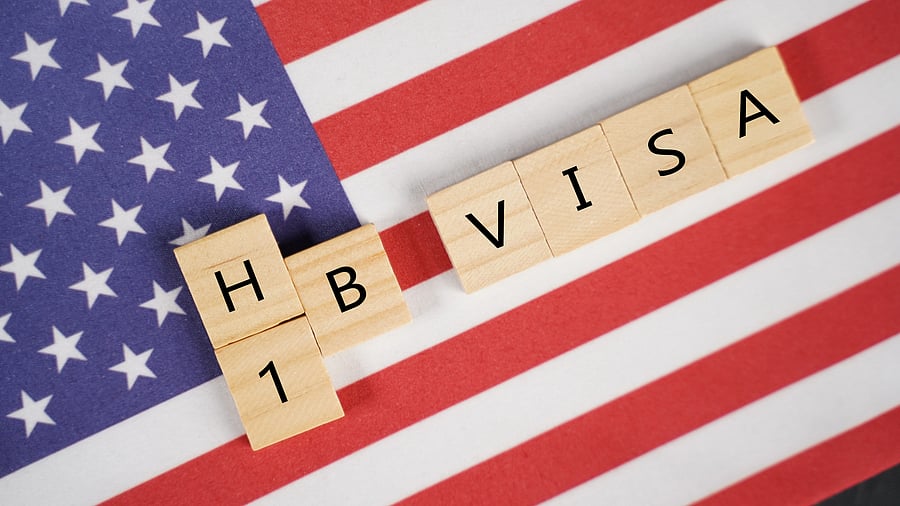
Representative image for H-1B visa
Credit: iStock Photo
Bengaluru: The introduction of a $1,00,000 annual fee on H-1B visa applications will impact Indian nationals that are on H-1B visas working for global and Indian companies. US President Donald Trump has signed an order and that will come into force on September 21.
IT industry body Nasscom said the country's technology services companies will also be impacted as business continuity will be disrupted for onshore projects and additional cost will require adjustments.
Nasscom said it is reviewing the finer details of the order. "Adjustments of this nature can potentially have ripple effects on America’s innovation ecosystem and the wider job economy. Companies will work closely with clients to adapt and manage transitions," it added.
It pointed out that India and India centric companies have been steadily reducing their reliance on these visas through increased local hiring in recent years.
"These companies also follow all necessary governance and compliance in the US for H-1B processes, pay the prevailing wages and contribute to the local economy and innovation partnerships with academia and startups. The H-1B workers for these companies by no means are a threat to national security in the US," it said.
The timeline for implementation (anyone entering the US after 12:01 am, September 21) is also a concern. A one-day deadline creates considerable uncertainty for businesses, professionals, and students across the world, it added.
While developments are under way, Nasscom said it will continue to monitor developments closely and engage with industry stakeholders on the potential implications.
Amazon (10,044 workers using H-1B visas as of June this year), TCS (5,505), Microsoft (5,189), Meta (5,123), Apple (4,202) and Google (4,181) are the greatest beneficiary of the visa programme.
According to the US Citizenship and Immigration Services (USCIS), the number of H-1B applications has been capped at 65,000 (regular cap) and 20,000 H-1B visa US advanced degree exemption, known as the master’s cap, for fiscal year 2026.
Indian IT firms such as TCS, Infosys, and Wipro heavily rely on H-1B visas to recruit talent from India, and these visa reforms facilitate easier access to skilled professionals and this is essential for maintaining their competitive edge in technology services.
Cognizant Spokesperson said that they are reviewing the President's Proclamation to evaluate the potential implications. "At this point, we do not have details to respond accurately. Cognizant has established a resilient business model that creates flexibility to hire the best candidates for open roles, including robust local recruiting and hiring infrastructure," the spokesperson added.
Kamal Karanth, Co-founder of Xpheno, a specialist staffing firm, said the proposed hike in H-1B visa fees is not a surprise, and IT services companies have been preparing for such developments. "Over the last six months, many of them have either nominated or hired new GCC heads to capitalise on the GCC route for business. While higher visa costs could slow down onsite hiring, it will only accelerate the offshoring momentum," he said.
"We expect MNCs to increase their reliance on GCCs and IT services firms in India, which remain a cost-effective option even after factoring in a 25% cess. In the near term, IT services companies may become more aggressive in offering GCC-specific services, and the increased supply of talent could also lead to softer pricing for GCC staffing," he added.
Shantanu Gangal, Co-founder and CEO of Prodigal — a Silicon Valley startup building AI agents for debt collections, said the $100,000 annual fee on H-1B visas makes the traditional pathway of pursuing an MBA or master’s in the US much harder to justify.
"For many students, the return on investment won’t add up when sponsorships become more selective and debt levels remain high," Gangal, who has experienced this first-hand, said.
His H-1B visa wasn't picked three times. "I know the anxiety and uncertainty that comes with it. But for engineers today, especially in AI, the equation looks very different. In this field, the market rewards skills and what you can build over pedigree. Standard degrees are increasingly irrelevant in such a fast-moving field. Companies are hiring based on what you can ship and AI is not limited by geographical boundaries, it is flattening borders even as immigration policies tighten them," he said.
He advised young talent not to wait for a visa and that they can start building in AI now. "The market will find you wherever you are," he added.
Meanwhile, former NITI Aayog CEO Amitabh Kant said Donald Trump’s 100,000 H-1B fee will choke US innovation, and turbocharge India’s. "By slamming the door on global talent, America pushes the next wave of labs, patents, innovation and startups to Bangalore and Hyderabad, Pune and Gurgaon . India’s finest Doctors, engineers, scientists, innovators have an opportunity to contribute to India’s growth & progress towards #ViksitBharat. America’s loss will be India’s gain," he said in a post on X.
Also reports suggest that Amazon told employees with H-1B visas who were already in the US to remain there and that anyone unable to make it back before the order takes effect should avoid attempting US re-entry.